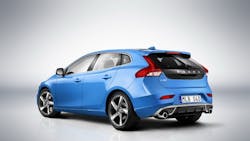Volvo Cars Returns to Profit on China Sales, Cost Cuts
STOCKHOLM -- Volvo Cars, the Swedish subsidiary of Chinese auto maker Geely, posted strong profits in 2013 after a first half year of losses, thanks to soaring China sales and cost-cutting.
The company reported a 960-million-kronor (US $149.7-million) net profit in 2013, compared to losses of 542 million kronor the year before.
The full-year result implied a startling turnaround in the second half of 2013, following a loss of 778 million kronor in the first half, and three consecutive six-month periods in the red before that.
"Apart from a good sales performance in the second half of the year, our focus on cost has been an essential factor in returning to profitability," Volvo Cars chief executive Haakan Samuelsson said.
Samuelsson, who already announced in January that the company had switched back into profit, said he expected continued growth in 2014.
"First and foremost, we will stay profitable in 2014," he said.
"The coming year will also be a year of growth, with a good five-percent increase in sales, characterized by a continued strong performance in China."
Sales in China, which seems to be on the brink of becoming Volvo Cars' most important market, grew by 45.6% in 2013 compared to a year earlier to reach 61,146 cars sold.
In the United States, so far Volvo Cars' strongest market, sales were down by 10.1% to 61,233.
In January, the company hinted at the need to broaden the product range in the U.S. market to boost sales.
Although global sales for the year were up by 1.4 percent to 427,840 cars, revenue in 2013 dropped to 122.3 billion kronor from 124.5 billion kronor in 2012.
Operating profit rose to 1.92 billion kronor from 66 million a year earlier.
The company's market share in Europe grew slightly from 1.87% in 2012 to 1.9% in 2013 and the group expects to keep it this year.
"Market circumstances in Europe are expected to remain challenging, but Volvo Cars aims to retain its market share in the region," the company said.
Volvo Cars was acquired by Geely in 2010, which manufactures brands such as Geely, Gleagle, Emgrand and Englon, unknown in the West.
The company has been independent from truck maker Volvo Group since 1999.
Copyright Agence France-Presse, 2014
About the Author
Agence France-Presse
Copyright Agence France-Presse, 2002-2025. AFP text, photos, graphics and logos shall not be reproduced, published, broadcast, rewritten for broadcast or publication or redistributed directly or indirectly in any medium. AFP shall not be held liable for any delays, inaccuracies, errors or omissions in any AFP content, or for any actions taken in consequence.
